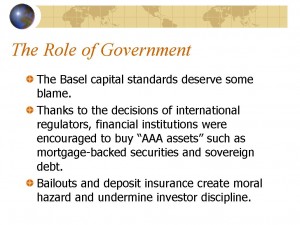This past Monday, I took part in a panel discussion about the financial crisis at the European Resource Bank in Brussels.
One of my main points was that people in private markets always make mistakes, but that this is a healthy and necessary process so long as there is a profit and loss feedback mechanism that encourages people to quickly learn when things go wrong (and also to reward them when they make wise decisions).
In the financial crisis, though, we saw the government interfere with this process. First, bad policies such as easy money from the Fed and corrupt Fannie Mae/Freddie Mac subsidies distorted market signals and caused a needlessly high level of mistakes. Second, bailouts interfered with the feedback mechanism, teaching people that large levels of imprudent risk are okay.
The politicians, unsurprisingly, didn’t learn the right lessons. Instead of reducing the level of government intervention, they imposed the Dodd-Frank bailout bill (named after two lawmakers who were pimps for Fannie and Freddie and thus disproportionately responsible for the crisis).
I don’t know if this is a case of too-little-too-late, but more and more people are waking up to the idea that regulation is the problem rather than the solution. Perhaps most important, some of these people are in positions of power.
Let’s begin with a look at how the Wall Street Journal’s editorial page reacted to some very important research by some uncharacteristically astute regulators from the Bank of England.
…the speech of the year was delivered at the Federal Reserve’s annual policy conference in Jackson Hole, Wyoming on August 31. And not by Fed Chairman Ben Bernanke. …BoE Director of Financial Stability Andrew Haldane and colleague Vasileios Madouros point the way toward the real financial reform that Washington has never enacted. The authors marshal compelling evidence that as regulation has become more complex, it has also become less effective. They point out that much of the reason large banks are so difficult for regulators to comprehend is because regulators themselves have created complicated metrics that can’t provide accurate measurements of a bank’s health. …Basel II relied far too much on the judgments of government-anointed credit-rating agencies, plus a catastrophic bias in favor of mortgages as “safe.” Instead of learning from that mistake, the gnomes have written into the new Basel III rules a dangerous bias in favor of sovereign debt. The growing complexity of the rules leaves more room for banks to pursue regulatory arbitrage, identifying assets that can be classified as safe, at least for compliance purposes. …in both the U.K. and U.S. the number of regulators has for decades risen faster than the number of people employed in finance. Complexity grows still faster. The authors report that in the 12 months after the passage of Dodd-Frank, rule-making that represents a mere 10% of the expected total will impose more than 2.2 million hours of annual compliance work on private business. Recent history suggests that if anything this will make another crisis more likely. Here’s a better idea: Raise genuine capital standards at banks and slash regulatory budgets in Washington. Abandon the Basel rules on “risk-weighting” and other fantasies of regulatory omniscience.
The references to the Basel regulations are particularly noteworthy.  These are the rules, cobbled together by regulators from different nations, and they’re supposed to steer financial institutions away from excessive risk.
These are the rules, cobbled together by regulators from different nations, and they’re supposed to steer financial institutions away from excessive risk.
You won’t be surprised to learn, though, that these rules caused imprudent behavior. Indeed, one of the slides from my presentation in Brussels specifically highlighted the perverse impact of the Basel regulations.
Some American regulators also understand the inverse relationship between regulation and well-functioning markets. The Wall Street Journal opines on the words of Thomas Hoenig.
The same “fundamentally flawed” system of financial rules that failed in 2008 lives on, “but with more complexity” in the latest proposals from regulators. That was the blunt message on Friday from Federal Deposit Insurance Corporation Director Thomas Hoenig. He was talking about the pending implementation of international bank capital standards known as Basel III. …Mr. Hoenig did a public service at an American Banker symposium by reviewing the relevant history from 2008: “It turns out that the Basel capital rules protected no one: not the banks, not the public, and certainly not the FDIC that bore the cost of the failures or the taxpayers who funded the bailouts. The complex Basel rules hurt, rather than helped the process of measurement and clarity of information.” Observing a Basel system that only grows more complicated as U.S. regulators prepare to implement the latest version, the former president of the Federal Reserve Bank of Kansas City also pointed out that the biggest winners from such regulatory regimes are never the little guys. Mr. Hoenig explained that “the most brazen and connected banks with the smartest experts will game the system…”
I closed my remarks in Brussels by saying that government does have a role in financial markets, but I said that it should focus on identifying and punishing fraud. The free market, by contrast, is the best way to promote safety and soundness.
More specifically, there is nothing quite like the possibility of failure and losses to encourage prudent behavior. As I stated in this interview, capitalism without bankruptcy is like religion without hell.
Hell, by contrast, occurs when government intervenes and sets up a system of private profits and socialized losses.
